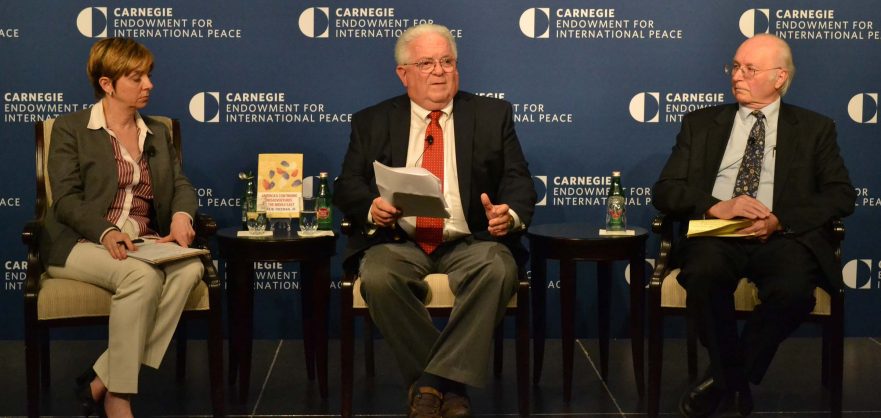In a new podcast released by Just World Books yesterday, former Assistant Secretary of Defense for International Security Affairs Amb. Chas W. Freeman, Jr., noted that the current U.S. military actions in Syria “have no framework in international law.”
Freeman, whose main (and very successful) career in the U.S. government was in the Foreign Service, downplayed the importance of the letter that 51 serving U.S. diplomats sent through the “dissent channel”, in which they called for more robust U.S. military action against Syria’s President Bashar al-Assad.
“In the general American public, this call for a military surge in Syria falls flat,” he said.
Freeman’s latest book, America’s Continuing Misadventures in the Middle East was released by Just World Books in mid-May, winning plaudits from a broad range of experts including the former Commander of Centcom, Adm. William Fallon, and Harvard University’s Prof. Stephen Walt.
In the podcast, Freeman argued that the U.S. public is “largely unaware of the huge loss of life and displacement of people [in Syria] that the fighting which we have aided and abetted has caused… We look at Syria mainly in terms of refugee flows but with a curious blind spot to our own responsibility for the creation of those flows.”
He said he judged the Russian military intervention in Syria to be, “an effective use of limited military means for limited political ends… [They have] forced the U.S. into a more genuine peace process than it had been engaged in, in Geneva… It is no longer a given that ‘Assad must go’ as a precondition for any transition.”
He stressed that any viable peace negotiation “has to include all the people who are strong on the ground and that emphatically includes President Assad.”
In other parts of the wide-ranging, 40-minute podcast, Freeman reflected on the peace negotiations that he took part in regarding the civil war in Angola, when he was Assistant Secretary of State for Africa in the late 1980s. He noted that there, too, the success of the negotiation required the inclusion in it of all parties with strength on the ground, including some with extremely distasteful records or ideologies.
He also noted that the concept of the international community having some “Responsibility To Protect” (R2P) populations deemed vulnerable to the actions of their own governments, which was cautiously adopted by the United Nations at a summit in 2005, “was killed in Libya, in 2011.” In that episode, NATO forces stretched an R2P mandate they had received for military action there and used the mandate also to support the forcible overthrow of President Muammar Qaddafi.
He talked a while about the Palestine Question, expressing some limited support for the tactic of Boycott, Divestment, and Sanctions (BDS) urged by many Palestinian rights advocates, but warning that he thought some such efforts “go too far.” He also drew a notable comparison between “rightwing parts of the organized Jewish community” in the United States and the powerful pro-gun lobbying organization the National Rifle Association. Both of them, he said, “try to dictate policy”, and have aroused growing resentment of those efforts.
Freeman spoke about the unusual volatility of the current U.S. political scene, noting that there could yet be a significant participation in the elections from the Libertarian Party, or from a Green Party (that might even, he said, be invigorated by an alliance with still-running Democratic Party candidate Sen. Bernie Sanders.) Along with many other experts on U.S. politics, he said that this year’s election might indeed see the end of the two-party system that has effectively been in place here in the United States since 1850.
“If Bernie Sanders runs as an independent, then Palestine very likely will be an issue in the elections,” he said.
You can listen to the whole of this very informative podcast here. And you can buy America’s Continuing Misadventures in the Middle East from our website or via your favorite book retailer.
JWE people, do you think international law should be applied in the Syrian conflict and if so, how? We welcome your courteous comments below.

